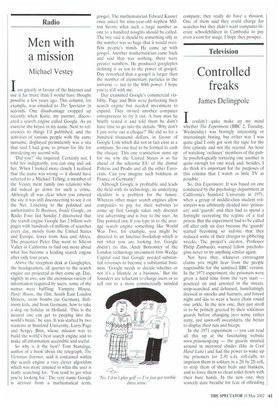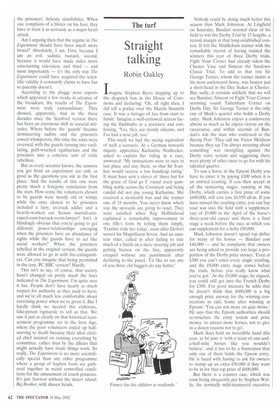Controlled freaks
James Delingpole
Icouldn't quite make up my mind whether The Experiment (BBC 2, Tuesday, Wednesday) was boringly interesting or interestingly boring, but either way I was quite glad I only got sent the tape for the first episode and not the second. An hour of watching 'ordinary' members of the public psychologically torturing one another is quite enough for one week and, besides, I do think it's important for the purposes of this column that I watch as little TV as possible.
So. this Experiment. It was based on one conducted by the psychology department at California's Stanford University in 1971, when a group of middle-class student volunteers was arbitrarily divided into 'prisoners' and 'guards' and then had to spend a fortnight recreating the regime of a real prison. But the experiment had to be called off after only six days because the 'guards' started becoming so sadistic that they reduced some of their charges to gibbering wrecks. The project's creator, Professor Philip Zimbardo, warned fellow psychologists never to try anything similar again.
Nor have they, whatever extravagant claims you might hear from the people responsible for the sanitised BBC version. In the 1971 experiment, the prisoners were given a hard time from the very start — pounced on and arrested in the streets, strip-searched and deloused, humiliatingly dressed in smocks and hairnets. and forced night and day to wear a heavy chain round one ankle. In the new one, they just stroll in to be politely greeted by their solicitous guards before changing into some rather natty, red sawn-off sweatshirts, the better to display their tats and biceps.
In the 1971 experiment — you can read all this up at the fascinating website www.prisonexp.org — the guards strutted around in mirrored shades (like in Cool Hand Luke) and had the power to wake up the prisoners for 2.30 a.m. roll-calls, to imprison them in solitary in a 2ft by 2ft cell, to strip them of their beds and blankets, and to force them to clean toilet bowls with their bare hands. In the new one, they scarcely dare breathe for fear of offending
the prisoners' delicate sensibilities, When one complains of a blister on his foot, they have to treat it as seriously as a major heart attack.
Am I arguing then that the regime in The Experiment should have been much more brutal? Absolutely, I am. First, because I am an evil, sadistic bastard, second, because it would have made miles more entertaining television, and third — and most importantly — it's the only way The Experiment could have acquired the scientific validity it constantly claims to have but so patently doesn't.
According to the pluggy news reports which appeared a few weeks in advance of the broadcast, the results of The Experiment were truly extraordinary. They showed, apparently, that in the three decades since the Stanford version there has been an enormous shift in societal attitudes. Where before the 'guards' became domineering sadists and the prisoners cowed whimperers, this time the roles were reversed, with the guards turning into vacillating, guilt-wracked egalitarians and the prisoners into a cohesive unit of virile rebellion.
But as every scientist knows, the answers you get from an experiment are only as good as the questions you ask in the first place. And the results of this one were pretty much a foregone conclusion from the start. How come the volunteers chosen to be guards were mostly old or wimpy while the ones chosen to be prisoners included a !airy, ex-crack addict and a heavily-worked out Scouse martial-artsexpert-cum-barrack-room-lawyer? Isn't it blindingly obvious that you're going to get different power-relationships emerging when the prisoners have an abundance of rights while the guards have to act like social workers? When the prisoners rebelled in the original version, the guards were allowed to go in with fire-extinguishers. Can you imagine that being permitted in the cosy, PC BBC version? Hardly.
This isn't to say, of course, that society hasn't changed on pretty much the lines indicated in The Experiment. I'm quite sure it has. People don't have nearly as much respect for authority as they used to have; and we're all much less comfortable about exercising power when we're given it. But I hardly think we needed this elaborate, fake-prison rigmarole to tell us that. We saw it just as clearly on that historical reenactment programme set in the Iron Age, where the poor volunteers ended up halfstarving to death because their idiot elected chief insisted on running everything by committee, rather than by the diktats that might actually have made things work. So really, The Experiment is no more scientifically special than any other programme where a group of hapless fools are gathered together in weird controlled conditions for the amusement of couch potatoes. It's just Survivor without the desert island; Big Brother, with shaven heads.















































































 Previous page
Previous page